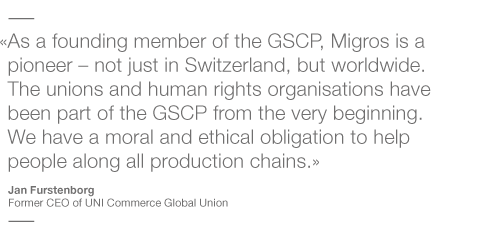Encouragement and control at source
With global production standards, cooperative initiatives and a code of conduct, Migros ensures that its products are produced responsibly. To this end, it is increasingly switching its focus from inspections to empowering companies.
Migros wants to be certain that the approximately 40'000 products it offers are produced in the most environmentally friendly way and under humane conditions. Focusing on globally applicable standards which its suppliers must adhere to, it regularly checks whether the producers are conforming to these requirements with regard to social and environmental acceptability. It also offers support to the producers in implementing the standards. As a founder member of the Business Social Compliance Initiative, an international organisation with more than 1000 affiliated companies, Migros also participates in the global refinement of the standard.
Social acceptability: BSCI and GSCP
As a founder member of the Business Social Compliance Initiative (BSCI), Migros has been demanding minimum social requirements pursuant to the BSCI code of conduct from all suppliers since 1997. Migros also accepts equivalent standards and has been committed to the Global Social Compliance Programme (GSCP) since its formation 2006. The GSCP is a multi-stakeholder initiative. It aims to make existing standards and initiatives in the areas of social acceptability and the environment comparable and to harmonise them around the world. Suppliers and factories are integrated into the BSCI process based on their risk.
Since 2008, a total of 561 Migros factories have been included in this process. Independent companies regularly conduct inspections, i.e. audits. Suppliers for which deficiencies are found during the audit must eliminate these within a certain period of time. 246 Migros suppliers were subjected to an audit in 2012. 18% performed well, whereas 51% failed to meet the requirements and 31% still need to rectify minor faults. The number of failed audits was slightly higher than in the previous year as significantly more first-time audits were conducted. These figures are within the sector average. The most frequent reason for the non-fulfilment is exceeding the working hours and the lack of management systems.
Migros is committed to increasing awareness of the BSCI and it also chairs the BSCI contact group in Switzerland.

Chart on results of the BSCI audit
Empowering suppliers
In addition to the enforcement of standards, Migros is focusing increasingly on empowering suppliers. Suppliers are given support with the implementation of corrective measures during the BSCI process. As part of the Intensive Consulting Programme (ICP), Migros Hong Kong held 20 training sessions at suppliers in China and other Asian countries. The Better Work programme, a locally integrated cooperative initiative of the International Labour Organization (ILO), focuses on training at all levels and offering factories individual support to eliminate deficiencies.
In 2012 a supplier company from the focus region of Southeast Asia took part in a pilot project for the first time. The aim is for 20 Migros production companies to be included in Better Work by 2015. The GSCP also focuses on empowering producers and suppliers. One of the four workshops on the subject of empowerment took place in November 2012 at the Federation of Migros Cooperatives in Zurich.
Enhanced agricultural standards
Migros demands that its suppliers of fruit, vegetables, flowers and plants conform to GlobalGAP, or to SwissGAP in Switzerland (GAP: good agricultural practices), which sets standards relating to agricultural production, food safety and environmental protection. Around 98% of fruit and vegetable suppliers and 96% of flower and plant suppliers are certified according to GlobalGAP, SwissGAP or equivalent systems.
Alongside GlobalGAP, the GlobalGAP-GRASP (GlobalGAP Risk Assessment on Social Practices) standard enables a risk assessment to be performed for agricultural businesses, in order to determine whether and to what extend specific working conditions are being observed. GRASP applies in regions where working conditions are often inadequate. More than 355 suppliers and small-scale farmers in Italy and Spain are included in the GRASP process.